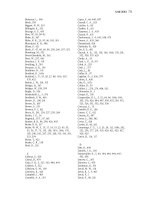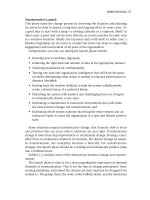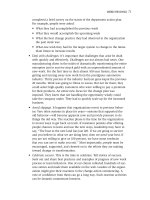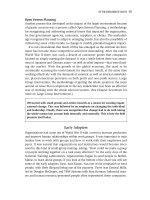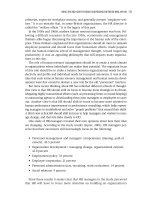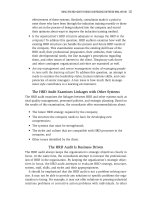Practicing Organization Development (A guide for Consultants) - Part 71 potx
Bạn đang xem bản rút gọn của tài liệu. Xem và tải ngay bản đầy đủ của tài liệu tại đây (248.68 KB, 10 trang )
Practicing Organization Development, 2nd Ed. Copyright © 2005 by John Wiley & Sons, Inc.
Reproduced by permission of Pfeiffer, an Imprint of Wiley. www.pfeiffer.com
APPENDIX II: FUTURE OD PRACTICE AND PRACTITIONER COMPETENCIES 671
Priority Competence
33. Knowledge, skills, and social technologies – ✓ +– ✓ +
for designing and implementing
effective methods for generating and 1 2 3 4 5 6 7 1 2 3 4 5 6 7
disseminating valid relevant knowledge
in organizations.
L. Appreciative Integral Change
34. Knowledge of the psychosocial – ✓ +– ✓ +
dynamics of change so as to awaken
and build on people’s natural 1 2 3 4 5 6 7 1 2 3 4 5 6 7
disposition toward development;
minimizing resistance by working on
the positive side of the process.
35. Skills in building high-performance – ✓ +– ✓ +
organizations that are also a great
place to work and in articulating how 1 2 3 4 5 6 7 1 2 3 4 5 6 7
this results in a win/win situation for
the organization, the organization
members, and customers and how a
focus on both performance and people
leads to competitive advantage.
38_962384 appb.qxd 2/3/05 12:20 AM Page 671
Practicing Organization Development, 2nd Ed. Copyright © 2005 by John Wiley & Sons, Inc.
Reproduced by permission of Pfeiffer, an Imprint of Wiley. www.pfeiffer.com
672 APPENDIX II: FUTURE OD PRACTICE AND PRACTITIONER COMPETENCIES
A Note About the Delphi Conference Design
This Delphi conference was designed and moderated by Saul Eisen. The Delphi
method generates responses to a sequence of questions that are put to a defined
group of relevant experts. Their answers to each question are summarized and
fed back to them, prioritized by the group, and then the prioritized list provides
the context for the next question.
Panel participants in this Delphi conference represented a range of relevant
expertise. Of the thirty-nine participants, twelve had experience and expertise
as internal consultants, eighteen as external consultants, twenty-one as educa-
tors in OD, nineteen as managers, and four as futurists.
The sequence of questions considered by our panel were as follows:
• Phase 1 of this Delphi process provides an environment scan for organi-
zations in a changing world. What are the most significant trends and
forces that you believe will affect organizations during the next decade?
• Phase 2 considers possible implications of these trends—what signifi-
cant challenges or opportunities will they create for organizations and
their managers?
• Phase 3 considers possible implications for practice in organization
development—what new or emerging intervention strategies and
approaches will be required to respond effectively to these challenges
and opportunities?
• Phase 4 considers possible implications for professional development in
OD—what new or emerging competencies will be needed to implement
these intervention strategies effectively?
We gratefully acknowledge the generous technical and professional support for
this project provided by Lenny Lind, president of CoVision, whose WebCouncil
environment (www.webcouncil.com) served as the communication medium for
this Delphi project.
This self-assessment process is based on the work of Hoy Steele, a departed
colleague. It is affectionately dedicated to his memory.
38_962384 appb.qxd 2/3/05 12:20 AM Page 672
ABOUT THE EDITORS
W
illiam J. Rothwell is professor-in-charge of workforce education and
development in the Department of Learning and Performance Systems
on the University Park campus of The Pennsylvania State University. He
leads a graduate emphasis in workplace learning and performance. He is also
president of Rothwell & Associates, Inc. (see www.rothwell-associates.com), a
full-service private consulting firm that specializes in all facets of workplace
learning and performance.
Dr. Rothwell completed a B.A. in English at Illinois State University, an M.A.
(and all courses for the doctorate) in English at the University of Illinois at
Urbana-Champaign, an M.B.A. at the University of Illinois at Springfield, and a
Ph.D. degree with a specialization in employee training at the University of Illi-
nois at Urbana-Champaign.
Before entering academe in 1993, Dr. Rothwell had twenty years of experi-
ence as a practitioner, serving first as training director for the Illinois Office of
the Auditor General and later as assistant vice president and management devel-
opment director for The Franklin Life Insurance Company, at that time a wholly
owned subsidiary of a Fortune 50 multinational company.
Best-known for his extensive and high-profile work in succession manage-
ment (see Effective Succession Planning, 2005), Dr. Rothwell has authored, co-
authored, edited, or co-edited numerous books, book chapters, and articles.
Among his most recent publications are the current ASTD competency study to
define the workplace learning and performance field entitled Mapping the Future
(with P. Bernthal and others, 2004), Beyond Training and Development (2nd ed.,
673
∂
∂
39_962384 about.qxd 2/3/05 12:24 AM Page 673
2005), Competency-Based Human Resource Management (with D. Dubois, 2004),
Linking Training to Performance (with P. Gerity and E. Gaertner, 2004), The
Strategic Development of Talent (with H. Kazanas, 2004), Mastering the Instruc-
tional Design Process, 3rd ed. (with H. Kazanas, 2004), Improving On-the-Job Train-
ing, 2nd ed. (with H. Kazanas, 2004), What CEOs Expect from Corporate Training:
Building Workplace Learning and Performance Initiatives That Advance Organiza-
tional Goals (with J. Lindholm and W. Wallick, 2003), Planning and Managing
Human Resources, 2nd ed. (with H.C. Kazanas, 2003), Creating Sales Training and
Development Programs: A Competency-Based Approach to Building Sales Ability
(with W. Donahue and J. Park, 2002), The Workplace Learner: How to Align Train-
ing Initiatives with Individual Learning Competencies (2002), and Building Effec-
tive Technical Training: How to Develop Hard Skills Within Organizations (with J.
Benkowski, 2002). Dr. Rothwell is also a book series co-editor, with Roland Sullivan
and Kris Quade, of the Pfeiffer book series, Practicing Organization Change and
Development, and a book series co-editor, with Rita Richey and Tim Spannaus, of
the Pfeiffer book series, Using Technology in Training and Learning.
R
oland L. Sullivan experienced his first National Training Laboratory (NTL)
Human Interaction Lab in 1962. Richard Beckhard, who first published the
phrase “management of change,” recognized Roland to be among the first
one hundred full-time change agents. Sullivan’s business purpose is to integrate
economic and human realities in the transformation of corporations through the
use of organization change and development (OCD). He defines OCD as whole
system transformation utilizing values-based collaborative processes in the
application of behavioral science wisdom to the adaptive enhancement of orga-
nizational features such as leadership, strategies, structures, business processes,
and human cultures. In sum, he applies strength-focused change competencies
to build with client systems extraordinary enterprises.
Sullivan did graduate work in OD at Loyola University and his post-graduate
work at Pepperdine, the most known academic change program in the world.
He looks forward to sharing his latest learning on the Pfeiffer website
(www.practicingod.com) and his own website (www.rolandsullivan.com).
Engage him for any reason at
674 ABOUT THE EDITORS
39_962384 about.qxd 2/3/05 12:24 AM Page 674
675
ABOUT THE CONTRIBUTING AUTHORS
B
illie T. Alban is president and senior partner of Alban and Williams, Ltd.,
Consultants to Organizations. In recent years, her practice has been focused
on working with organizations and communities on large-scale change
efforts, using highly participative methods, which increase the ownership of the
new strategies, direction, and structure. Some of her clients include ITT, Gen-
eral Electric, Kraft General Foods, Bankers Trust, Johnson and Johnson, NASA,
Mount Sinai Hospital, British Airways, Cathay Pacific Airways, Pfizer Pharma-
ceuticals, Equitable Life, Hewlett-Packard, and INTEL. Ms. Alban has served in
various staff and faculty positions at the Tavistock Institute in England, the
National Training Laboratories, the Executive Development Programs and Grad-
uate School of Management Programs for Columbia University, UCLA, Pepper-
dine University, and others. In addition to several publications, she edited with
Barbara Bunker a special edition of the Journal of Applied Behavioral Science
on large group interventions, now in its fifth printing. Her most recent book,
with Barbara Bunker, is Large Group Interventions: Engaging the Whole System
for Rapid Change (Jossey/Bass).
J
uana Anguita, whose degree is in social psychology, is president of Anguita
& Associates, a consulting firm in Santiago, Chile. She is founder and pro-
fessor of the master’s program in OD at the Universidad Diego Portales, the
only such program in Latin America. She established the Leadership and OD
∂
∂
39_962384 about.qxd 2/3/05 12:24 AM Page 675
676 ABOUT THE CONTRIBUTING AUTHORS
Institute and is an international consultant. She has written over forty articles
and textbooks. She has been an OD practitioner and scholar, both nationally
and internationally, for over twenty-five years. She is a mentor in Dick
Beckhard’s Mentoring Project at ODN. She can be reached at San Sebastian 2966
13 Floor, El Golf, Santiago, Chile; phone: 56–2–2342119;
M
ila N. Baker is a director at Pfizer in New York City. She has served as a
member of the adjunct faculty at the University of Cincinnati and previ-
ously held senior positions in OD at the BSVHS in Jacksonville, Florida,
and at Ethicon Endo-Surgery, a Johnson and Johnson Company. She has pre-
sented papers at many conferences and has written several internal publica-
tions. She is a member of the OD Network Board of Trustees.
C
hristina Barr, guided by her talent for integrating creativity and business
acumen, founded Square One Solutions, Inc. Her firm guides and supports
both individuals and organizations in creating environments where creativ-
ity and business discipline, chaos and structure, process and focus work in
dynamic harmony. Ms. Barr and her team possess both the right-brain ability to
solve problems and the left-brain capacity to engage in process and analysis. They
apply this knowledge to integral coaching and consulting, creative and innova-
tive modes of leadership, the development of learning organizations, and the art
and practice of creating sustainable excellence. Ms. Barr has a BFA in graphic
design from the University of Illinois Urbana/Champaign and an MA in organi-
zation development from the Fielding Graduate Institute. She is a Certified Inte-
gral Coach through New Ventures West and serves on the board of the Chicago
Coach Federation.
F
rank J. Barrett, Ph.D., is associate professor in the Graduate School of Busi-
ness and Public Policy at the Naval Postgraduate School in Monterey, Cali-
fornia, where he is director of the Center for Positive Change. He is also a
faculty member in the School of Human and Organizational Development at the
Fielding Graduate Institute. He received his BA in government and international
relations from the University of Notre Dame, his MA in English from the
University of Notre Dame, and his Ph.D. in organizational behavior from Case
Western Reserve University. Dr. Barrett has consulted to various organizations,
including Nokia, Boeing, The U.S. Navy, Ford Motor Manufacturing Division,
Bell South, Granite Construction, GlaxxoWelcom, General Electric, British Petro-
leum, Johnson and Johnson, Price Waterhouse Coopers, BBC, The Council of
Great Lakes Governors, Omni Hotels, The Cleveland Clinic Foundation, and
University Hospitals of Cleveland. He has written and lectured widely on social
constructionism, appreciative inquiry, organizational change, jazz improvisa-
tion, and organizational learning.
39_962384 about.qxd 2/3/05 12:24 AM Page 676
ABOUT THE CONTRIBUTING AUTHORS 677
D
avid L. Bradford is senior lecturer in organizational behavior and dean of
the Executive Program on Leadership and Power at the Graduate School of
Business at Stanford University. He has published Managing for Excellence,
Influence Without Authority, and Power Up: Transforming Organizations Through
Shared Leadership (all co-authored with Allan Cohen) as well as numerous arti-
cles. He was the founder and first executive director of the Organizational Behav-
ior Teaching Society and first editor of their professional journal, Journal of
Management Education. He is a member and has served on the board of direc-
tors of the NTL Institute. In addition to teaching and research, he has consulted
for many organizations in the for-profit and not-for-profit sectors, including IBM,
Levi Strauss, Raychem, Oracle for Small Business, Cisco Systems, Hewlett-
Packard, Detroit Institute of Art, and the Whitney Museum of American Art.
L
ynn Brinkerhoff is the vice president of HRSystemworks, a full-service HR
firm, and co-founder of The Indian Institute, a non-profit organization help-
ing to develop programs and institutions focused on the well-being of Native
Americans. A graduate of the Pepperdine MSOD Program, she is a leadership
coach, conflict mediator. and social venture entrepreneur, focusing for the past
twenty years on researching and applying the most effective approaches to per-
sonal effectiveness. Ms. Brinkerhoff’s previous work experiences include wilder-
ness guide, dance instructor, international sales manager, and marketing
executive. Her current work in interfaith ministry emphasizes the need to tend
first to issues of emotional intelligence, personal autonomy, and authenticity so
that one can better join with, or contribute to, the larger system. She is currently
writing a book on individual development in organization development (ID
in OD) with W. Warner Burke and John Scherer. She can be reached at
W
. Warner Burke is Edward Lee Thorndike Professor of Psychology and
Education in the Department of Organization and Leadership at Teachers
College, Columbia University in New York. Originally educated as a
social-organizational psychologist (Ph.D., University of Texas, Austin), Dr. Burke
is currently engaged in teaching, research, and consulting. He teaches leader-
ship, organizational dynamics and theory, and organization change and consul-
tation. His research focuses on multi-rater feedback, leadership, and organization
change. Dr. Burke’s consulting experience has been with a variety of organiza-
tions in business and industry, education, government, religious, medical sys-
tems, and professional services firms. Dr. Burke is the author of more than 130
articles and book chapters on organization development, training, change and
organizational psychology, and conference planning; and author, co-author, edi-
tor, and co-editor of fourteen books. His latest book, published by Sage, is
Organization Change: Theory and Practice. He is the recipient of numerous
39_962384 about.qxd 2/3/05 12:24 AM Page 677
678 ABOUT THE CONTRIBUTING AUTHORS
awards, among them the Public Service Medal from the National Aeronautics
and Space Administration (1989), the Distinguished Contribution to Human
Resource Development Award (1990), the Organization Development Profes-
sional Practice Area Award for Excellence—The Lippitt Memorial Award—from
the American Society for Training and Development (1993), the Distinguished
Scholar-Practitioner Award from the Academy of Management (2003), and the
Organization Development Network’s Lifetime Achievement Award (2003).
S
teven H. Cady is the director of Bowling Green State University’s Master of
Organization Development Program, editor for the Organization Develop-
ment Journal, and founder of the Passionate and Authentic Living Institute.
He is committed to using cutting-edge approaches that inspire system-wide
change in organizations and is actively pursuing research and practice that
unleash passion at the individual and organizational levels. He publishes,
teaches, and consults on topics of organizational behavior and psychology,
change management, and organization development. Prior to receiving his Ph.D.
in organizational behavior from Florida State University, Dr. Cady studied at the
University of Central Florida, where he obtained an MBA and a BSBA in finance.
He can be contacted at 419–372–9388;
J
eanne Cherbeneau, Ph.D., is president of Cherbeneau & Associates, an
OD/HR consulting firm in La Jolla, California, where she specializes in exec-
utive coaching, leadership, change management, and strategic and succes-
sion planning. She has spent numerous years managing and consulting,
internally and externally, with both profit and nonprofit organizations, in vari-
ous industries, as well as educational institutions and public and private agen-
cies. She has served as a member of Marshall Goldsmith’s Alliance for Strategic
Leadership (A4SL), on the board of the National OD Network, and as vice pres-
ident of the Golden Gate Chapter of ASTD. She has also worked with commu-
nity service organizations (president, Berkeley Rotary Club; board member,
Berkeley-Albany YMCA) and educational institutions (Saybrook Graduate
School). She is the author of several articles and chapters in such books as
The Promise of Diversity and Values and Ethics in Organization Development.
Contact her at
D
avid Coghlan, Ph.D., is a faculty member of the School of Business Studies
at the University of Dublin, Trinity College, where he teaches organization
development and action research. His research interests focus on organi-
zation development, action research, clinical inquiry, action learning, reflective
practice, practitioner research, and doing action research in one’s own organi-
zation. He is on the editorial review board of the OD Practitioner and was asso-
ciate editor-international of the OD Journal from 1996 to 2003. He has published
39_962384 about.qxd 2/3/05 12:24 AM Page 678
ABOUT THE CONTRIBUTING AUTHORS 679
over sixty articles and book chapters. He has published several books, including
The Dynamics of Organizational Levels (co-authored with Nicholas Rashford)
in the Addison-Wesley OD series (1994); Doing Action Research in Your Own
Organization (with Teresa Brannick, Sage, 2001), Changing Healthcare Organi-
sations (with Eilish McAuliffe, Blackhall, 2003, 2005), and Managers Learning
in Action (co-edited with T. Dromgoole, P. Joynt, & P. Sorensen, Routledge, 2004.)
D
avid L. Cooperrider is professor and chair of the Department of Organi-
zational Behavior-Weatherhead School of Management, Case Western
Reserve University. He is past president of the National Academy of
Management’s Division of Organization Development and a co-founder of The
Taos Institute. He has lectured and taught at Stanford University, MIT, the Uni-
versity of Chicago, Katholieke University in Belgium, Pepperdine University,
Cambridge, and others. Professor Cooperrider has served as researcher and con-
sultant to a wide variety of organizations, including Allstate, Cap Gemini Ernst
and Young, Verizon, Yellow Roadway Corp., Green Mountain Coffee Roasters,
McCann-Erickson, Nutrimental, World Vision, Cleveland Clinic, American Red
Cross, and United Way of America. Most of these projects are inspired by the
appreciative inquiry (AI) methodology for which Professor Cooperrider is best
known. His dynamic ideas have been published in journals such as Adminis-
trative Science Quarterly, Human Relations, Journal of Applied Behavioral Sci-
ence, The OD Practitioner, and in research series such as Advances in Strategic
Management. He has published seven books and authored close to fifty articles
and book chapters. Professor Cooperrider’s most recent volumes include
Collaborating for Change: Appreciative Inquiry (with Diana Whitney); Organi-
zational Courage and Executive Wisdom and Appreciative Leadership and
Management (both with Suresh Srivastva), and International and Global OD
(with Peter Sorenson). He was recognized in 2000 as among “the top ten vision-
aries” in the field by Training magazine. In 2004 he received ASTD’s top award
for distinguished contribution to workplace learning and performance.
T
homas G. Cummings is professor and chair of the Management and Orga-
nization Department at the Marshall School of Business, University of South-
ern California. He has authored over sixty articles and nineteen books. Dr.
Cummings is associate editor of the Journal of Organizational Behavior, presi-
dent-elect and fellow of the Academy of Management, and is listed in American
Men and Women of Science and Who’s Who in America.
K
atherine M. Curran, Ph.D., has been president of Resources for Creative
Change, Inc., an organizational consulting firm, since 1992. Her work
focuses on strategic change management, organizational politics, and exec-
utive coaching. Her for-profit client base ranges from small, high-technology
39_962384 about.qxd 2/3/05 12:24 AM Page 679
680 ABOUT THE CONTRIBUTING AUTHORS
start-ups to global corporations such as 3M, Medtronic, Cargill, and Hasbro, in
addition to European clients. Her public-sector work with governance transfor-
mation ranges from the federal government down to the city and county level.
She holds a doctorate from The Fielding Institute and a two-year postgraduate
certificate in group process and organization development from the Gestalt
Institute of Cleveland.
K
athleen D. Dannemiller, passionate advocate for whole system change for
more than thirty years, was founder and partner emeritus of Dannemiller
Tyson Associates. Prior to her recent passing, she was a worldwide author-
ity on the complexities of whole-systems change and how to implement these
methodologies, having written numerous articles and the book, Whole-Scale
Change: Unleashing the Magic in Organizations. Ms. Dannemiller was also a
contributor to a new book, The Change Champion’s Field Guide: Strategies and
Tools for Leading Change in Your Organization (Best Practice Publications).
K
aren J. Davis, a global organizational consultant for over thirty years, is on
the faculty of the organization development and behavior master’s program
at Universidad Diego Portales in Chile. She is actively involved in the Inter-
national Organization Development Association (IODA) and has served on the
board of trustees of the Organization Development Network (ODN). She also
serves on the board of a large healthcare corporation. Her life and her work are
rooted in earth wisdom, in open space, and in global community. She describes
herself as a “global citizen and gardener.” Ms. Davis can be reached at
W
. Gibb Dyer, Jr., is the O. Leslie Stone Professor of Entrepreneurship and
the academic director of the Center for Economic Self-Reliance in the
Marriott School of Management at Brigham Young University. He received
his B.S. and M.B.A. degrees from Brigham Young University and his Ph.D. in
management philosophy from the Massachusetts Institute of Technology. Before
coming to BYU, he was on the faculty at the University of New Hampshire, and
he has served as a visiting professor at IESE (Instituto de Estudios Superiores de
la Empresa) in Barcelona, Spain. He publishes widely on the topics of family
business, entrepreneurship, organizational culture, and managing change in orga-
nizations, and his articles have appeared in many of the top journals in his field.
He has authored several books, included the award-winning Cultural Change in
Family Firms. His most recent book is Consulting to Family Businesses with Jane
Hilburt-Davis. Because of his innovative approach to teaching, Dr. Dyer was
awarded the 1990 Leavy Award for Excellence in Private Enterprise Education
by the Freedoms Foundation at Valley Forge. Dr. Dyer is a recognized authority
on family business and entrepreneurship and has been quoted in publica-
tions such as Fortune, The Wall Street Journal, The New York Times, and Nation’s
39_962384 about.qxd 2/3/05 12:24 AM Page 680
